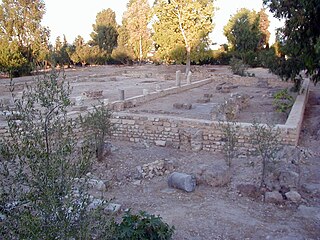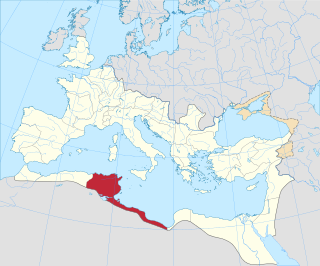Related Research Articles

Augustine of Hippo, also known as Saint Augustine, was a theologian and philosopher of Berber origin and the bishop of Hippo Regius in Numidia, Roman North Africa. His writings influenced the development of Western philosophy and Western Christianity, and he is viewed as one of the most important Church Fathers of the Latin Church in the Patristic Period. His many important works include The City of God, On Christian Doctrine, and Confessions.

Donatism was a Christian sect leading to a schism in the Church, in the region of the Church of Carthage, from the fourth to the sixth centuries. Donatists argued that Christian clergy must be faultless for their ministry to be effective and their prayers and sacraments to be valid. Donatism had its roots in the long-established Christian community of the Roman province Africa Proconsularis and Mauretania Tingitana, in the persecutions of Christians under Diocletian. Named after the Berber Christian bishop Donatus Magnus, Donatism flourished during the fourth and fifth centuries. Donatism mainly spread among the indigenous Berber population, and Donatists were able to blend Christianity with many of the Berber local customs.
Marcellinus of Carthage was a Christian martyr and saint who died in 413. He was secretary of state of the Western Roman Empire under Roman emperor Honorius and a close friend of Augustine of Hippo, as well as a correspondent of Saint Jerome. Saint Augustine dedicated the first books of his landmark The City of God to Marcellinus in 413.

Donatus Magnus, also known as Donatus of Casae Nigrae, was the leader of a schismatic Christian sect known as the Donatists in North Africa, Algeria. He is believed to have died in exile around 355.

Traditor, plural: traditores (Latin), is a term meaning "the one(s) who had handed over" and defined by Merriam-Webster as "one of the Christians giving up to the officers of the law the Scriptures, the sacred vessels, or the names of their brethren during the Roman persecutions". It refers to bishops and other Christians who turned over sacred scriptures or betrayed their fellow Christians to the Roman authorities under threat of persecution. During the Diocletianic Persecution between AD 303 and 305, many church leaders had gone as far as turning in Christians to the authorities and "handed over" sacred religious texts to authorities to be burned. Philip Schaff says about them: "In this, as in former persecutions, the number of apostates who preferred the earthly life to the heavenly, was very great. To these was now added also the new class of the traditores, who delivered the holy Scriptures to the heathen authorities, to be burned".
Ticonius, also spelled Tyconius or Tychonius, was a major theologian of 4th-century North African Latin Christianity. He was a Donatist writer whose conception of the City of God influenced St. Augustine of Hippo.

Optatus, sometimes anglicized as Optate, was Bishop of Milevis, in Numidia, in the fourth century, remembered for his writings against Donatism.

Assuras, sometimes given as Assura or Assur, was a town in the Roman province of Proconsular Africa.

The bibliography of Augustine of Hippo contains a list of works published by fourth-century Christian bishop and theologian Augustine of Hippo.

Cartennae or Cartenna was an ancient Carthaginian and Roman port at present-day Ténès, Algeria. Under the Romans, it was part of the province of Mauretania Caesariensis.

The Archdiocese of Carthage, also known as the Church of Carthage, was a Latin Catholic diocese established in Carthage, Roman Empire, in the 2nd century. Agrippin was the first named bishop, around 230 AD. The temporal importance of the city of Carthage in the Roman Empire had previously been restored by Julius Caesar and Augustus. When Christianity became firmly established around the Roman province of Africa Proconsulare, Carthage became its natural ecclesiastical seat. Carthage subsequently exercised informal primacy as an archdiocese, being the most important center of Christianity in the whole of Roman Africa, corresponding to most of today's Mediterranean coast and inland of Northern Africa. As such, it enjoyed honorary title of patriarch as well as primate of Africa: Pope Leo I confirmed the primacy of the bishop of Carthage in 446: "Indeed, after the Roman Bishop, the leading Bishop and metropolitan for all Africa is the Bishop of Carthage."
Secundus of Tigisis was an early church leader and primate of Numidia. He was a leading organiser of the early Donatist movement in Carthage.

Majorinus was the leader of a schismatic Christian sect in Roman North Africa known as the Donatists.

Gaguari is a former diocese of North Africa and since 1933 a titular bishopric. The location of the former diocese is for the moment unknown. Under Roman hegemony, the bishop belonged to the province of Byzacène. This province was located in North Africa. The exact location of Gaguari can not be determined for the current state of research. However, everything leads us to believe that the bishopric site localizes to the current Sahel of Tunisia.

Felicianus of Musti was a bishop of Musti in Numidia, Roman North Africa, involved in the Donatist controversy of the 4th century. He is known to history through the writings of Augustine of Hippo Regius.
Marcarius was an imperial notary sent in 340 to enforce an imperial edict against the Donatist community, in Bagai, Numidia, Roman North Africa.

Bagai was a Roman–Berber city in the province of Africa Proconsularis. It must have been of some reasonable size, as it was also the seat of an ancient Catholic bishopric. The ancient city has been identified with ruins at Ksar-Bagaï outside of Baghai, in the Aurès Mountains of the El Hamma District in Khenchela Province, Algeria.
Parmenian was a North African Donatist bishop, the successor of Donatus in the Donatist bishopric of Carthage. He wrote several works defending the rigorist views of the Donatists and is recognized as "the most famous Donatist writer of his day", but none of his writings have survived.
Donatus of Bagaï, also known as Donatus of Aurasium, was an ancient Donatist bishop and martyr whose life and actions played a significant role in the complex religious landscape of 4th century Numidia. Despite being primarily known through hostile reports, notably found in Optatus' "Contra Parmenianum Donatistam" Donatus of Bagai left a lasting impact on the Donatist movement.

Marculus of Thamugadi or simply Marculus was a prominent bishop and Christian martyr venerated by the 4th-century North African Donatist Church.
References
- ↑ Rogatist ,| Oxford Dictionaries
- ↑ Allan D. Fitzgerald "Rogatism", in Allan D. Fitzgerald (ed.), Augustine through the Ages: An Encyclopedia, Grand Rapids. Eerdmans, 1999, pp. 725-625 (with bibliography)
- ↑ Michael Gaddis, There is no Crime for those who have Christ (Berkeley, University of California Press, 2005) p. 131.
- ↑ Michael Gaddis, There is no Crime for those who have Christ, p. 121.
- ↑ Michael Gaddis, There is no Crime for those who have Christ, Berkeley, University of California Press, 2005, p. 132.
- ↑ Augustine, Epistle 185.3.13
- ↑ Augustine, The nature and origin of the Soul 1.2.2 &III.2.2
- ↑ Augustin, Letter 93
- ↑ Jesse Hoover, The Contours of Donatism (ProQuest, 2008) p. 266-267 &269.
- ↑ Jesse Hoover, The Contours of Donatism (ProQuest, 2008 ) p. 270